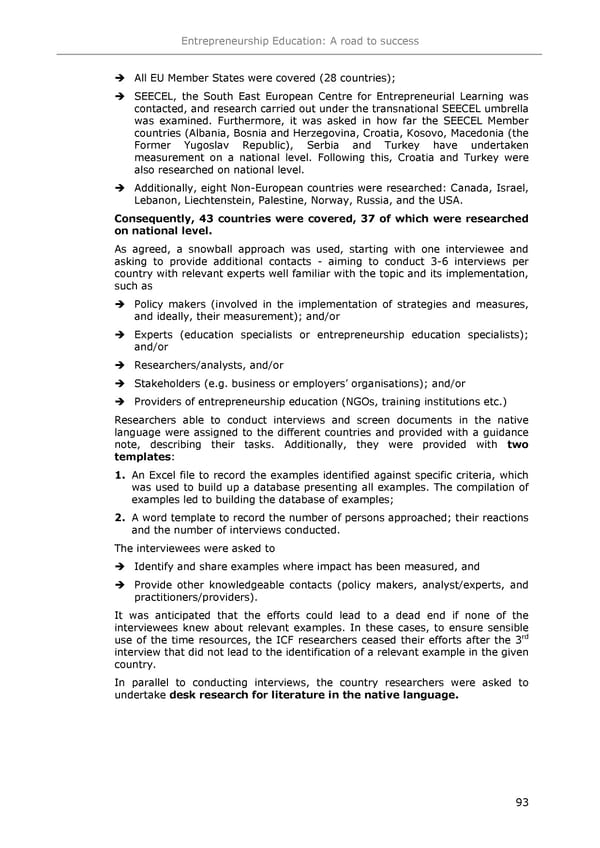Entrepreneurship Education: A road to success All EU Member States were covered (28 countries); SEECEL, the South East European Centre for Entrepreneurial Learning was contacted, and research carried out under the transnational SEECEL umbrella was examined. Furthermore, it was asked in how far the SEECEL Member countries (Albania, Bosnia and Herzegovina, Croatia, Kosovo, Macedonia (the Former Yugoslav Republic), Serbia and Turkey have undertaken measurement on a national level. Following this, Croatia and Turkey were also researched on national level. Additionally, eight Non-European countries were researched: Canada, Israel, Lebanon, Liechtenstein, Palestine, Norway, Russia, and the USA. Consequently, 43 countries were covered, 37 of which were researched on national level. As agreed, a snowball approach was used, starting with one interviewee and asking to provide additional contacts - aiming to conduct 3-6 interviews per country with relevant experts well familiar with the topic and its implementation, such as Policy makers (involved in the implementation of strategies and measures, and ideally, their measurement); and/or Experts (education specialists or entrepreneurship education specialists); and/or Researchers/analysts, and/or Stakeholders (e.g. business or employers9 organisations); and/or Providers of entrepreneurship education (NGOs, training institutions etc.) Researchers able to conduct interviews and screen documents in the native language were assigned to the different countries and provided with a guidance note, describing their tasks. Additionally, they were provided with two templates: 1. An Excel file to record the examples identified against specific criteria, which was used to build up a database presenting all examples. The compilation of examples led to building the database of examples; 2. A word template to record the number of persons approached; their reactions and the number of interviews conducted. The interviewees were asked to Identify and share examples where impact has been measured, and Provide other knowledgeable contacts (policy makers, analyst/experts, and practitioners/providers). It was anticipated that the efforts could lead to a dead end if none of the interviewees knew about relevant examples. In these cases, to ensure sensible use of the time resources, the ICF researchers ceased their efforts after the 3rd interview that did not lead to the identification of a relevant example in the given country. In parallel to conducting interviews, the country researchers were asked to undertake desk research for literature in the native language. 93
 Entrepreneurship Education Page 96 Page 98
Entrepreneurship Education Page 96 Page 98